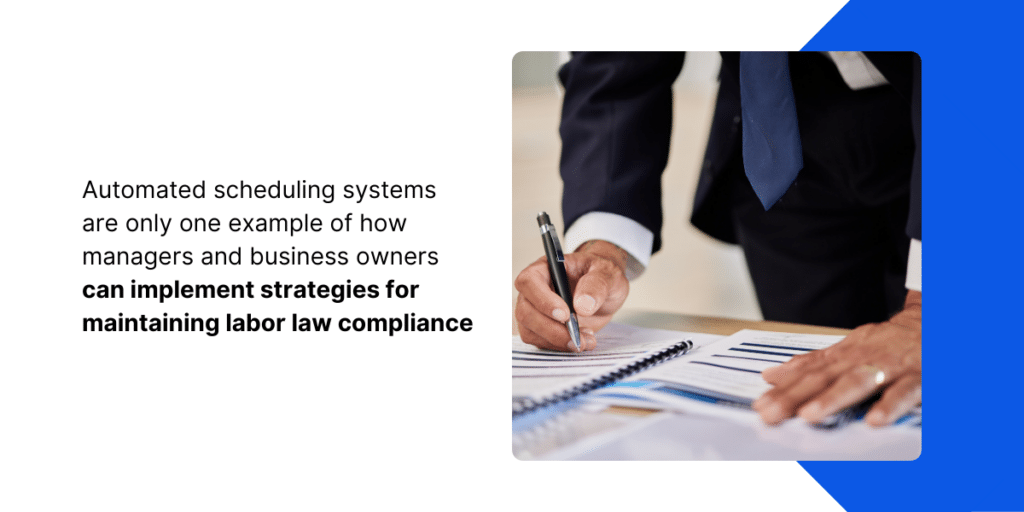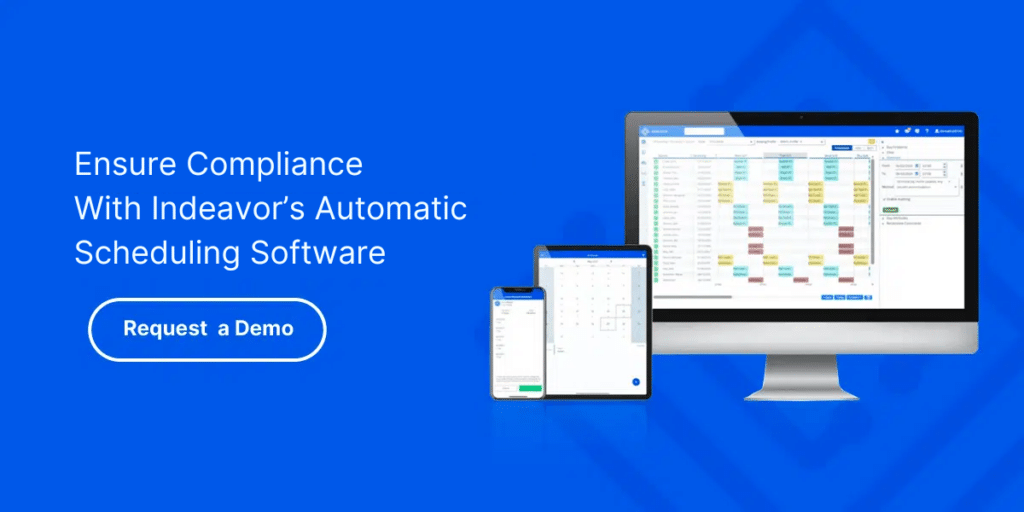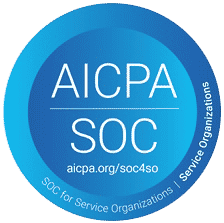Newly enacted California labor laws will impact the workplace in 2024. Effective January 1, 2024, the following employment laws will create a cascading effect for schedulers and front-line supervisors managing day-to-day operations.
Minimum Wage Increase
A key California labor law update is minimum wage has increased from $15.50 to $16.00 per hour—regardless of employee headcount. This also means that exempt employees in California—those who don’t work at an hourly rate—still have a minimum threshold as well. They must be paid a minimum annual salary of $66,560.
Different local ordinances require a higher minimum wage based on their cost of living needs, with West Hollywood being the highest at $19.08. The UC Berkeley Labor Center has compiled a list of city and county minimum wages across the state.
Paid Sick Leave Expansion
Another key California labor law update is outlined by the California Department of Industrial Relations (DIR), SB 616 is one of California’s most significant paid sick leave expansions of the past decade. It increases paid sick leave entitlements to 5 days (40 hours), up from the previous 3 days (24 hours). These days may carry over to the following year of employment, with the accrual cap being raised to 10 days (80 hours); a big difference from the 6-day (48-hour) cap.
SB 616 also broadens how employees can accrue these hours, allowing employees to choose from the following methods:
- Accrue 1 hour of paid sick leave for every 30 hours worked
- “Front load” by being given 5 days (40 hours) of accrual at the beginning of employment and every 12 months afterward
- Accrue at a rate other than 1 hour for every 30 hours worked, so long as the accrual results in at least 3 days (24 hours) of paid sick leave by the 120th day of employment and 5 days (40 hours) by the 200th day of employment
If an employee chooses to accrue all 5 days upfront, the employer does not need to carry over unused hours to the following year.
Employee Leave for Reproductive Loss
The California Legislature has enacted SB 848, a new law that further enhances protected leave. It requires employers with five or more employees to provide up to 5 days of job-protected leave to employees who have suffered a reproductive loss event. The bill prohibits an employer from refusing to grant an employee’s request to take this leave, protecting the employee from discrimination or unjust firing.
According to the new California labor law, affected employees must take the leave within three months of the event, though are not required to take time off consecutively. If an employee experiences more than one reproductive loss event within 12 months, the employer must provide up to 20 days within a 12-month period.

Other California Labor Law Updates
Amplified Stance on Employee Mobility
SB 699 and AB 1076 further codifies California’s stance on prohibiting post-employment non-compete clauses. AB 1076, the companion bill, requires employers to notify current and former employees (employed after January 1, 2022) that any non-compete clause or agreement already entered into is void. This must be done in writing by February 14, 2024.
Marijuana Use Protections
SB 700 and AB 2188 protect a person’s off-site, off-duty marijuana use. Employers are also prohibited from asking a job applicant about their prior use. These new protections do not cover everyone, with those in the building and construction workers being exempt. The new law does not permit the possession or use of cannabis on the job, even for medicinal purposes.
Workplace Violence Prevention Plan Requirement
SB 553 requires nearly all California employers to establish, implement, and maintain an effective workplace violence prevention plan by July 1, 2024. At a minimum, this plan must cover the following essential components:
- Designation of responsible individual(s) for executing the program
- Establishment of an employer’s mechanism for identifying and assessing workplace hazards, incorporating scheduled inspections to detect unsafe conditions and practices
- Development of procedures for promptly addressing and rectifying unsafe or unhealthy conditions and practices
- Implementation of an occupational health and safety training program to educate employees on general practices and provide job-specific hazard training
- Creation of a communication system for engaging with employees on occupational health and safety matters
- Enforcement of protocols to ensure employee adherence to safe and healthy work practices, including the potential implementation of disciplinary measures when necessary
Employers must also maintain detailed records regarding any identification, evaluation, and correction, including a detailed violent incident log.

How Indeavor Helps Keep Employers Compliant
No matter how big or small your organization is, the hourly rate has gone up—and the rate of pay is not consistent due to the location-based living wage ordinances. If you have facilities across the state of California, you need to confirm local standards to ensure compliance with all wage requirements.
For some California employers, staying within budget while adhering to the minimum wage and paid leave increases may be hard to balance. Indeavor Operate doesn’t just help automate the scheduling process; it helps organizations control costs. Indeavor’s automated workflows solve problems without impacting production, creating dynamic schedules that can quickly adapt to unexpected leave.
Automated Compliance & Documentation
Indeavor tracks assigned and actual work hours for every employee, providing the essential data needed to ensure adherence to minimum paid leave requirements and carry-over allowances. Employers can also create customized paid leave policies for their specific labor needs and industry requirements directly in the platform—including whichever accrual rate options employees choose, per SB 616—so that all employee information is in one place.
This can also include an audit log for violent incidents, alongside all other pertinent documentation to prevent violence in the workplace, so that employers can be prepared for the July 1 deadline for the new California Labor Laws.
Strategic Backfilling
When an employee calls out sick one morning, front-line managers can rest assured that Indeavor will fill the vacancy quickly and accurately. Smart Backfill™ automates the call process, eliminating the need for busy supervisors to manually call or text employees themselves. With algorithms in place, skills and certifications, availability, hourly rates, and hours worked will be considered so that the vacancy can be filled with the most qualified (and available) employee. All these factors may be overlooked when a frantic supervisor is just trying to get someone to show up on the floor.
You can also support last-minute absence requirements with Indeavor Call. These workflows are designed specifically for real-time scheduling needs. Leverage Indeavor’s own workforce management experts to capture employee call-offs and call available, certified employees for you.
The Indeavor Engage app lets organizations seamlessly manage unexpected gaps in the schedule by empowering employees to fill it themselves. When a sick employee calls off in the app, other employees can volunteer for the shift; only those with the right skills and certifications will be approved to fill in. This minimizes disruptions to operations and maintains productivity levels, even amidst staffing shortages.
Overtime Management
Indeavor’s scheduling logic doesn’t just fill gaps with the most qualified employee; it takes it a step further by taking into account the number of hours worked that week to avoid accidental overtime. Smart Backfill™ lets employers spread overtime hours equally across their workforce. Front-line supervisors can prioritize call lists by those who have the lowest (or no) OT hours, giving them a shot at the vacancy first.
With real-time visibility into employee schedules and workload distribution, you’ll be provided with data to identify potential overtime scenarios to mitigate excess labor costs proactively. If you’re looking to stay ahead of any future California labor law changes, book a demo or give us a call today!







